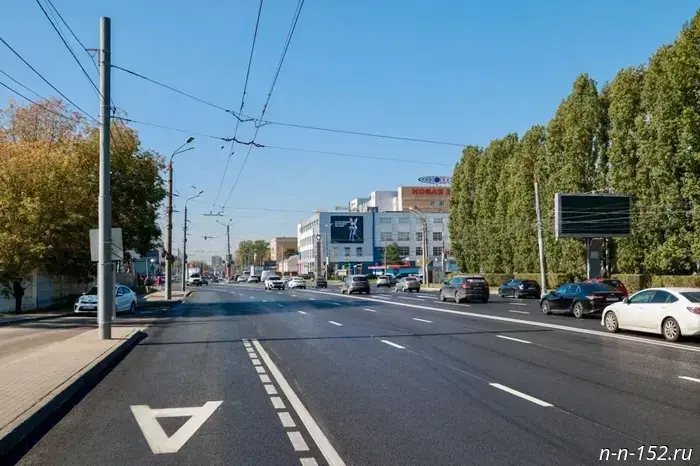
Nizhny Novgorod residents named the most in-demand professions for the next five years.
Most residents of the Nizhny Novgorod Region are open to future changes in the labor market, ready to change professions, acquire hard and soft skills, and are confident that specialists in artificial intelligence and machine learning will be the most in-demand in five years. These are the results of a joint study by Russia’s leading online recruitment platform hh.ru and the II International Symposium "Creating the Future," which will be held on October 7–8, 2025, in Moscow.
A total of 2,644 residents from different regions of the country took part in the survey. Many Russians (68%) believe that in five years specialists in artificial intelligence and machine learning will be the most sought-after in the labor market. Developers in the field of cybersecurity are also expected to be in high demand—65% of respondents are confident of this—followed by scientists (44%) and specialists in agriculture (32%). Another 21% are banking on psychologists, 9% on designers, and 7% on soft-skills coaches.
The survey results among residents of the Nizhny Novgorod Region are comparable to the nationwide figures. More than half of the region’s respondents are also confident in the demand for AI and machine learning specialists (62%), cybersecurity developers (57%) and scientists (52%). Nizhny Novgorod residents place high hopes on robotics and automation engineers (48%), specialists in agriculture and organic production (43%). Slightly fewer expect demand for data analysts (30%) and digital transformation managers (23%). Another 16% believe that psychologists, environmentalists, and specialists in alternative energy will find their place in the labor market in five years; 10% are confident in designers, and only 3% in soft-skills coaches.
At the same time, the development of artificial intelligence and the automation of labor processes do not, by themselves, cause concern among the region’s residents. Forty-nine percent of respondents are confident that neural networks will not replace their jobs, 15% believe that only some tasks may be automated, and 8% already work with AI tools. Only 3% of respondents fear losing their jobs because their profession is at risk.
Overall, Nizhny Novgorod residents are open to artificial intelligence: 64% are neutral about the introduction of AI technologies into professional life, as the main thing is to retrain in time; another 26% welcome its spread because it frees up time for creative tasks. Only 10% see artificial intelligence as a threat to social stability.
Moreover, the region’s workers demonstrate flexibility and adaptability: 66% of respondents are ready to change professions if their current one becomes less in demand and are already considering options. Fifteen percent are ready to take serious steps if external support is available.
To remain in demand on the labor market, residents of the region resort to various methods. Thirty-three percent of respondents are learning to work with AI tools, 30% regularly analyze the labor market and monitor trends, 23% are mastering an adjacent profession, and 20%—a new one. In addition, 13% are building a financial safety cushion; 8% are building a personal brand and constantly updating their portfolio; 7% are studying various sciences. Thirteen percent do nothing, hoping for help from the state or their employer.
Residents of the Nizhny Novgorod Region do not tire of striving for new knowledge and skills. A large majority of respondents, namely 72%, plan to develop their hard and soft skills in the near future. Twenty-six percent have not thought about it, and 2% do not plan to. Sixty-nine percent will develop skills voluntarily because they want to remain competitive. Ten percent will do so only if there is no other choice.
As for hard skills, 64% of respondents are betting on working with AI tools, 41% on programming, the same share on design, and 39% on data analysis. Twenty-seven percent of respondents will study marketing and product management. Another 18% plan to master cybersecurity. Among soft skills, Nizhny Novgorod residents prioritize critical thinking (66%), emotional intelligence (52%), creativity and adaptability (41% each). Thirty-six percent prefer to improve project management skills, and 34%—communication and teamwork skills.
The overwhelming majority of respondents (80%) will acquire new skills on their own: by reading books and articles and watching educational videos. Fifty-five percent prefer corporate programs, and 41%—online courses. Twenty-five percent are more conservative and focus on traditional offline training. Another 9% rely on learning in communities, mentoring and coaching.
“Purposeful development of specific professional skills is an absolutely correct strategy that suits any job seeker. This is what one should focus on in order not to be left behind in the labor market. Today employers are actively moving to a skill-based approach to personnel selection. Formal indicators such as education, diploma color, and length of service are taking a back seat to specific skills. This is due to a shortage of specialists who possess the competencies required by business. Where and how a candidate acquired them is secondary; what matters more is that they can validate and demonstrate their skills in practice,” notes Marina Dorokhova, Head of the "Career and Skills" division at hh.ru.
To understand which skills will be in demand in the near future, Nizhny Novgorod residents analyze various information sources. The most popular are: media and blogs (39%), career platforms—such as hh.ru (38%), professional communities and forums (34%). Thirty-one percent of respondents turn to colleagues and employers for help, 16% to courses and educational platforms, 11% to government resources, and 7% consult career specialists or coaches.
Scenarios of societal development and changes in the labor market, including in the context of digital transformation, will be discussed as part of the expert program of the II International Symposium "Creating the Future"—the flagship event of the National Center "Russia," which will take place on October 7–8, 2025. The annual symposium, organized at the instruction of Russian President Vladimir Putin under the auspices of the Decade of Science and Technology, will bring together more than 7,000 participants from SCO and BRICS countries, the Asia-Pacific region and Europe. The result will be futuristic forecasts that can be tracked, discussed and adjusted.
Background:
The International Symposium "Creating the Future" is the main platform for co-designing positive scenarios for future development. The event is held under the auspices of the Decade of Science and Technology in our country. The symposium was held for the first time at the National Center "Russia" from November 4 to 6, 2024, at the instruction of Russian President Vladimir Putin. The platform brought together more than 6,000 people from 101 countries. Among them were representatives of government and business, scientists and engineers, futurists and forecasters, public figures and representatives of the creative industries from BRICS, SCO and CIS countries. Russia at the symposium was represented by: Sergei Kirienko, First Deputy Head of the Presidential Administration of the Russian Federation and Chairman of the Organizing Committee of the National Center "Russia"; Denis Manturov, First Deputy Prime Minister of the Russian Federation; Maxim Oreshkin, Deputy Head of the Presidential Administration of the Russian Federation; Sergey Lavrov, Minister of Foreign Affairs of the Russian Federation; and many others.
Source: Directorate of the Exhibition of Achievements "Russia"
Press release
Другие Новости Нижнего (Н-Н-152)
 Registration is open for the 3rd International Forum on Digital Technologies in Transport and Logistics, "Digital Transportation".
The 3rd International Forum on Digital Technologies in Transport and Logistics, "Digital Transportation 2025", will take place on October 1–2, 2025 in Moscow at the Lomonosov cluster venue. 19.09.2025. Nizhegorodskaya Pravda. Nizhny Novgorod Region. Nizhny Novgorod.
Two teenagers without driver's licenses were injured in a motorcycle accident in Urensky District.
A traffic accident involving two underage motorcyclists who did not have driver's licenses occurred in the Urensky District of Nizhny Novgorod Oblast. 19.09.2025. Vremya N. Nizhny Novgorod Oblast. Nizhny Novgorod.
Registration is open for the 3rd International Forum on Digital Technologies in Transport and Logistics, "Digital Transportation".
The 3rd International Forum on Digital Technologies in Transport and Logistics, "Digital Transportation 2025", will take place on October 1–2, 2025 in Moscow at the Lomonosov cluster venue. 19.09.2025. Nizhegorodskaya Pravda. Nizhny Novgorod Region. Nizhny Novgorod.
Two teenagers without driver's licenses were injured in a motorcycle accident in Urensky District.
A traffic accident involving two underage motorcyclists who did not have driver's licenses occurred in the Urensky District of Nizhny Novgorod Oblast. 19.09.2025. Vremya N. Nizhny Novgorod Oblast. Nizhny Novgorod.
 Repair of a one-kilometre section of the Moscow Highway has been completed in Nizhny Novgorod.
Nizhny Novgorod News
Repair of a one-kilometre section of the Moscow Highway has been completed in Nizhny Novgorod.
Nizhny Novgorod News
 The labor inspectorate is investigating a worker's fall from a construction site in Nizhny Novgorod.
Nizhny Novgorod News
The labor inspectorate is investigating a worker's fall from a construction site in Nizhny Novgorod.
Nizhny Novgorod News
 The Ministry of Agriculture launched the "MediaPole" contest for authors of materials about rural life.
Nizhny Novgorod News
The Ministry of Agriculture launched the "MediaPole" contest for authors of materials about rural life.
Nizhny Novgorod News
 The festival "Autumn in Switzerland. Jazz of Victory" will take place in Nizhny Novgorod.
There will be a lot of music and movies in Nizhny Novgorod this weekend. The editorial team of pravda-nn.ru will report on the weekend's most interesting events. September 19, 2025. Nizhegorodskaya Pravda. Nizhny Novgorod Oblast. Nizhny Novgorod.
The festival "Autumn in Switzerland. Jazz of Victory" will take place in Nizhny Novgorod.
There will be a lot of music and movies in Nizhny Novgorod this weekend. The editorial team of pravda-nn.ru will report on the weekend's most interesting events. September 19, 2025. Nizhegorodskaya Pravda. Nizhny Novgorod Oblast. Nizhny Novgorod.
Nizhny Novgorod residents named the most in-demand professions for the next five years.
Most residents of the Nizhny Novgorod region are open to future changes in the labor market, ready to change their profession, acquire hard and soft skills, and are confident, 19.09.2025. Nizhegorodskaya Pravda. Nizhny Novgorod region. Nizhny Novgorod.
